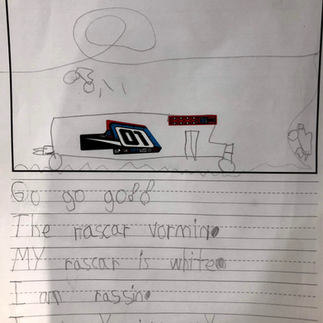What I learnt from offering play as a reward.
- Joshua Barr (M.A. M.Ed)
- Oct 17, 2022
- 4 min read
I once worked in a kindergarten that wore the strips of 'academically focused' with pride. In fact, we were told clearly "this is not a play based school". Like many academically focused kindergartens one of the main jobs was getting students reading and writing. I taught the oldest class, 5-6 years old, and I worked hard to get my students to the expectations of the school and parents. For most of the students I did it and for some it just wasn't possible, because no matter what you do, you can't rush individual development and readiness. I know this because I was the child who didn't learn to read until eight or nine years of age, no matter how much my parents and teachers tried. And hey look at me now!
Over time I knew this approach wasn't right. The lack of play, only twenty minutes of recess, learning divided by subjects is not what children need. I adjusted my practice to be more play based, to allow my students more freedom and choice. I was also very honest with my students. I told them there were things we were suppose to learn each day and the quicker we did it the more time we could play. I went against the "rules" where math class etc. had to be a certain length of time. If they could do it in 10-20 minutes why spend 90 minutes on math? The students responded, they listened, did the work and enjoyed more free time to play. We were all happier.
I still met challenges though. For example, when it came to writing some students would do only the minimum required. I would tell them they need to write a sentence or story using the weekly phonics and sight words and when done they could go play. They would write the same basic sentence/story each day, draw a simple picture, hand it to me and run off to do more important things. I couldn't blame them as that is what I would do in the same position. I realized that even though I wasn't giving out stickers or bringing back the behavior chart to clip them down I was still engaging in the "carrot and stick" reward and punishment system. The reward was play, something they actually wanted and my tasks were in the way.
"If you have been promised a reward, you come to see the task as something that stands between you and it. The easier that job is, the faster you can be done with it and pick up your prize." (Punished by Rewards, Alfie Kohn)
I told them to write something and they did. If I told them they needed to write three lines they would but they didn't care about it or value the process of creative writing. I wanted them to try at this because not only was it a grade level requirement but many of the students had the writing ability to do so. So I changed tactics.

I wanted the students to not feel like writing was work but something you could do for fun and enjoyment. This wasn't easy due to the current mindset I had created, that writing was in the way of play, an obstacle to overcome. I also struggled to change the mindset of families who would correct every spelling mistake their child made. I would tell them it is normal, they aren't suppose to spell all words correctly and what we are looking for is using the phonics rules they had been learning, trying to sound out words as they hear them.
I spent more time sitting with students, reading their stories and asking them questions about them. I decided I needed to show genuine interest for them to care about it more and it worked. I also wrote stories with the students. I sat down and we crafted stories together using their imagination to make it happen. It didn't take long before the mindset began to change and more students were writing stories for fun, for play. I observed students who previously didn't enjoy or struggled to write, try harder because their friends were writing more during play time. Soon I didn't even need to have the class, I just put a pile of papers with writing lines on a shelf. When they wanted they could get the paper and with every story they made I read it with joy asking questions, laughing, and discussing where the story could go next together. I even became a character in more than a few stories, often being eaten by something. Unfortunately I couldn't find any pictures of them.
(Take a look at some creative writing samples below from Chinese students aged 5-6 years.)
The purpose of this article is not to get early years educators to teach their students to write like the samples above with a full proof approach. There is none! I am simply trying to highlight that our aim is to help children find pleasure and joy in learning because without it what is the point. Using rewards or punishment to make them do things shows us that we are merely trying to control them rather than do what every school claims it wants to make, life long learners.
"rewards do not require any attention to the reasons that the trouble developed in the first place. You don't have to ask why the child is screaming, why the student is ignoring his homework, why the employee is doing an indifferent job. All you have to do is bribe or threaten that person into shaping up. (Notice that this too describes a fundamental similarity between punishments and rewards.)
A mother in Virginia wrote to me not long ago to challenge my criticism of behavioral manipulation. "If I cannot either punish (or allow consequences) or reward (bribe) my children ... what do I do when my almost three year old ... wanders out of her room again and again at bedtime?" she asked. Fair enough: let us consider three possible ways of dealing with a child who will not stay in bed. Behaviorist A favors "consequences": "If you're not back in that bed by the time I count to three, young lady, you won't be watching television for a week!" Behaviorist B favors rewards: "If you stay in bed until morning for the next three nights, honey, I'll buy you that teddy bear you wanted."
But the nonbehaviorist wonders how anyone could presume to propose a solution without knowing why the child keeps popping out of bed."
(Punished by Rewards, Alfie Kohn)
















Comments